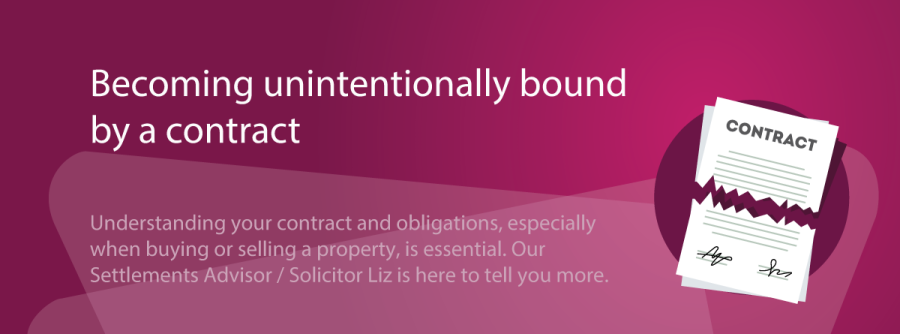Is it possible to become unintentionally bound by a property contract?
Buying a property is exciting but it’s also a big commitment and can be risky if you don’t understand your obligations when signing a contract. So, imagine the stress of becoming bound by a contract without the intention of doing so!
When are you bound by a contract?
Contracts for the purchase and sale of real estate are required to meet several criteria to be binding and must be in writing. In practice a buyer often makes an offer in writing to buy a property by signing a contract and the seller can accept that offer by countersigning the contract at which stage a contract is formed (also known as exchanged). This is often facilitated by the sales agent or through each party’s legal representatives.
Once a contract is exchanged it is legally binding on the parties subject to any right of the buyer to terminate the contract under any cooling off period or any rights of a party to terminate under a condition of the contract (such as finance approval or building and pest inspection conditions).
It is therefore very important to understand what you are signing or agreeing to before you sign a contract so as to not create unintentional obligations.
Under what circumstances can you withdraw from a contract?
Cooling off
Buyers may have a cooling off period in which they can terminate the contract for any reason before the expiry of the cooling off period and any pay a small termination fee to the seller. The cooling off period differs between jurisdictions in Australia. There is no cooling off period in Western Australia nor is there any cooling off period for any sales at auction or under auction conditions. Find out more about cooling off periods on this blog: lawlab.com.au/blog/cooling-off-periods
Contract conditions
Buyers may be able to terminate a contract if their contract includes a condition allowing that if the condition is not satisfied or fulfilled. It is common practice in some jurisdictions but not in others for contracts to include these types of conditions but the ability for a buyer to negotiate the inclusion of these types of conditions may depend on market conditions. Sellers may be less willing to agree to these conditions in a seller’s market where many buyers are competing for fewer properties.
For example:
- If the contract included a finance approval condition and the buyer could not obtain finance approval by the condition due date then the buyer may be entitled to terminate the contract and recover the deposit paid.
- If the contract included a building and pest inspection condition and the inspection report identified defects or pest infestation that the buyer was not satisfied with then the buyer may be entitled to terminate the contract and recover the deposit paid, or leverage this right to negotiate the defects to be rectified or a price reduction to cover the costs of doing so.
Deeming provisions – the trap to becoming unintentionally bound!
A deeming provision is contract condition that ceases to exist once the due date has expired and unless affirmed, terminated or extended prior, would automatically ‘deem’ to be satisfied, making the contract unconditional in that regard.
Deeming provisions are industry standard in some jurisdictions but not others. For example:
- In Western Australia and in the Northern Territory, inspections condition deems on the due date unless waived, extended or the contract is terminated prior to this date.
- In Victoria, the finance approval and inspections conditions are both deeming provisions.
- In South Australia, in the rare circumstances where a contract has an inspections condition, this will be a deeming provision.
It is therefore very important that when these conditions apply, that you apply for your finance and complete any inspections as soon as possible and also let your legal representative know the outcome prior to the due dates. Engaging a conveyancing lawyer like lawlab who understand these potential problems will reduce the risk that you become unintentionally bound by a contract.
When does a contract become unconditional?
Unconditional is a term used to confirm that the parties no longer have the option to rely on a condition of the contract to withdraw or terminate. In other words, all conditions are now satisfied and the parties are locked into the obligations they have signed up to under the contract.
It is important to note that conditions and contractual obligations are not often the same and the distinction is as follows:
- Condition - something that needs to be satisfied, waived or used to terminate prior to a specific deadline in order to allow the contract to move forward to completion.
- Obligation or term - these are requirements under the contract which must be performed by the respective party to fulfil their obligations.
If a buyer cannot complete an unconditional contract then the seller would usually have a right to terminate the contract, keep the deposit and sue the buyer for any damages (including any loss on resale).
What is the best way to avoid becoming unintentionally bound to a contract?
- Seeking appropriate legal advice prior to signing a contract and retaining good legal representation throughout the conveyancing process in order to ensure that the relevant requirements are met, and to ensure that you are kept informed of upcoming due dates.
- Ensure that you have arranged the required finances, have considered the necessary expenses involved with the contract and are ready to sign the required forms as they become required throughout the buying or selling journey.
- Keep good records and be ready to make decisions before the required dates, with the assistance of your legal representative.
Lawlab works with thousands of property buyers and sellers every year
We use this experience to make the conveyancing process easier for you.
Get started nowHave any questions?
For more information please call us on 1800 529 522 or send us your enquiry.


